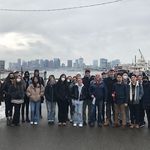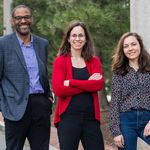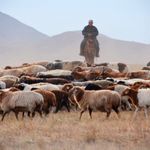Taking Knowledge, Ideas, and Experience into Action
The liberal arts and sciences encourages students to engage with complicated issues and different perspectives, to ask tough questions, to gather and analyze evidence, to make persuasive arguments, to put facts and figures in context, and to master a subject or subjects while honing critical thinking and analytical skills. Courses, co-curricular activities, internships, community engagement initiatives, and research projects give students countless opportunities to build on the knowledge and skills they gain in the classroom, explore new ideas, ask questions, test possible interests, create networks and connections, and translate passions into real-world pre-professional experiences. In this way, BU Arts & Sciences prepares students for any future that they choose. Here are some spaces where our former students—now alumni—took arts and sciences into action.
 On Alaska’s Glaciers, Life Is Harsh—and So Is the Reality of Climate Change
On Alaska’s Glaciers, Life Is Harsh—and So Is the Reality of Climate Change
“It gets eerie the farther you move into the ice field… Because there’s nothing to support life out there…it feels almost otherworldly.” —BU undergraduate researcher Anne Randall (CAS’22), who spent three months living on the ice and tracking how glaciers are melting
 Historical Research and Development of Six Walking Tours in Chelsea
Historical Research and Development of Six Walking Tours in Chelsea
“To develop these historic walking tours for the City of Chelsea, students used their brains (conducting both archival research and oral history interviews, analyzing a wide variety of primary and secondary sources), their hearts (developing their skills of historical empathy, learning to craft engaging narratives), and their feet (tramping the streets of Chelsea and Boston).” —Bruce J. Schulman, William E. Huntington Professor of History
CISS Undergraduate Interns Showcase Cutting-Edge Social Science Research
A centerpiece of Center for Innovation in Social Science initiatives is the Social Sciences Undergraduate Internships in Social Justice and Sustainability program, which provides students paid research experience working with a BU faculty member studying a cutting-edge social issue.
 Baking a New Path for Herself
Baking a New Path for Herself
Jane Gross credits her liberal arts education with her success—and her nimbleness—throughout her career. “It gave me the foundation to do anything.”—Jane Gross (CAS’88)
 CorpsAfrica Adapts the Peace Corps Model to Build Resilience in Rural Africa
CorpsAfrica Adapts the Peace Corps Model to Build Resilience in Rural Africa
“We train our volunteers in human-centered design… We don’t want to go to a community and say, ‘Do you want a school?’ It’s the wrong question. If you want to help somebody, listen to them; facilitate conversations to help them identify their highest priority development needs.” —Liz Fanning (CAS’87)
 A Career of Dividends
A Career of Dividends
“What makes the work so exciting to me is that we can make a real difference at these moments. Understanding where clients are in experience and temperament is central to what we do.” —Jane Williams (CAS’71)
Fighting Climate-Related Food Insecurity
“I’ve had a very circuitous path to reach this point. It often seemed on the surface like the dots weren’t connected, but when you look at all of the things I did and learned, from software development to humanitarian work, the complete set of experiences was my guiding light.” —Amit Wadhwa (CAS’99)
 NASA Gives Boost to BU-led Effort to Model Solar System’s Protective Bubble
NASA Gives Boost to BU-led Effort to Model Solar System’s Protective Bubble
“More and more we’re understanding the importance of the heliosphere for life on Earth, for how the climate was on Earth, as well… Until now, the heliosphere was not central for habitable studies.” —Merav Opher, professor of astronomy and principal investigator of the SHIELD DRIVE Science Center.
Building a Diverse, Strong Climate Workforce
“To me, a climate workforce means successfully preparing our graduates to tackle climate challenges… We know that temperatures are rising, weather events are becoming more extreme, and these are all impacting human health and well-being. Having graduates understand how we can both reduce the greenhouse gas emissions that lead to climate change and create solutions to help humans adapt to the ways that climate is already changing is essential.” —Pam Templer, professor of biology and director of the BU URBAN Program.

